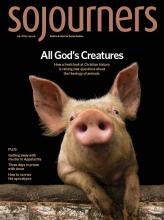THE MOVIES AND MEANING community recently published our list of greatest films, based on the idea that in a great film the highest aims of craft and the most humane visions meet. It seeks a “third way” between one reactionary notion, that art should be judged on the basis of what it portrays rather than how it portrays it, and another—that content is morally neutral. I say bring it all: love and pain and action and laughter and grief and sex and violence and horror and contemplation. To extend Roger Ebert’s notion, a movie is not only about what it’s about, but it’s also about how it’s about it.
The most beloved films on our list include The Tree of Life (in which the most enormous, transcendent existential questions mingle with the most ordinary of tragedies and blessings), Lone Star (which aims for nothing less than the healing of U.S. memory, for survivors and perpetrators alike), and Wings of Desire, Beasts of the Southern Wild, and Spirited Away (which use magic and the supernatural to remind us of the miracle of everyday life). The top 10 also includes Schindler’s List—a testament to monstrous suffering and extraordinary courage alike—and the Three Colors trilogy, which does the seemingly impossible: take a national political virtue and fully embody it in the life of an individual.
The new version of The Jungle Book is too recent for the list and hasn’t had the chance to prove its staying power, but what a glorious surprise it turned out to be. The beloved 1967 cartoon is held in great affection, but affection that requires turning a blind eye to its colonialist and racist undertones—particularly the literal aping of some black cultural tropes by a character presented as nonhuman, whose greatest desire is to “be like you.” The 2016 version works to transcend white supremacy and even critiques human interference with the rest of nature. When a villain comes to a violent end, it’s not through the hero’s superior strength but through the bad guy’s own selfishness.
Read the Full Article
